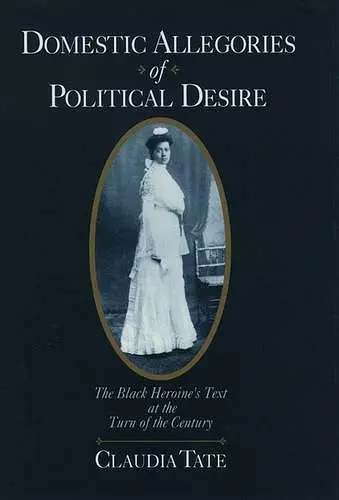Domestic Allegories of Political Desire
The Black Heroine's Text at the Turn of the Century
Format:Paperback
Publisher:Oxford University Press Inc
Published:19th Sep '96
Currently unavailable, and unfortunately no date known when it will be back
This paperback is available in another edition too:
- Hardback£107.50(9780195073898)

Why did African-American women novelists use idealized stories of bourgeois courtship and marriage to mount arguments on social reform during the last decade of the nineteenth century, during a time when resurgent racism conditioned the lives of all black Americans? Such stories now seem like apolitical fantasies to contemporary readers. This is the question at the centre of Tate's examination of the novels of Pauline Hopkins, Emma Kelley, Amelia Johnson, Katherine Tillman, and Frances Harper. Domestic Allegories of Political Desire is more than a literary study; it is also a social and intellectual history--a cultural critique of a period that historian Rayford W. Logan called "the Dark Ages of recent American history." Against a rich contextual framework, extending from abolitionist protest to the Black Aesthetic, Tate argues that the idealized marriage plot in these novels does not merely depict the heroine's happiness and economic prosperity. More importantly, that plot encodes a resonant cultural narrative--a domestic allegory--about the political ambitions of an emancipated people. Once this domestic allegory of political desire is unmasked in these novels, it can be seen as a significant discourse of the post-Reconstruction era for representing African-Americans' collective dreams about freedom and for reconstructing those contested dreams into consummations of civil liberty.
"A ground-breaking work....As a pioneering work, it is itself critical history."--Women's Review of Books
"[A] fascinating study....Highly recommended."--Choice
"Claudia Tate has been one of our significant leaders in showing us how deep, powerful, fascinating, and important the writing by African-American women is. Her newest book, Domestic Allegories of Political Desire, is a triumphant exploration of their history and achievements."--Catharine Stimpson, Rutgers University
"Claudia Tate's book takes the archeological project of excavating the rich vein of black women writers' contributions to African American literature another step forward. Here is more proof of the coming of age of literary studies in this field. Tate's groundbreaking exploration of eleven post-Reconstruction stories, the first on domestic novels of black women writers, casts this group in a new light and gives fresh life to the whole body of scholarship on the domestic novel in America."--Nellie McKay, University of Wisconsin
"A fascinating and informative discussion of the post-Reconstruction novels of black women. Claudia Tate has provided us with an elegantly written and persuasively argued account of the gendered nature of the relations between political desire and the cultural politics of fiction. This book is indispensable for understanding the ways in which black women created and maintained fictional landscapes of hope, equity and justice in the face of a historical landscape of intensifying racist oppression."--Hazel V. Carby, Yale University
"A significant contribution to American literary scholarship about forgotten and unknown works....Tate approaches her subject with years of concentrated thought....Offers profound insights into literature that is increasingly reaching wider audiences and enriching the canon."--Belles Lettres
"Tate has given us a treasure: a valuable new perspective on Reconstruction and post-Reconstruction histories and historiographies in combination with a sensitive cross-cultural insight into women's and, particularly black women's, relation to that culture. Because of her familiarity with Reconstruction and post-Reconstruction historiography, and because of her sensititve reading of the materials she uses, Tate's book deserves an honored place in historical literature."--American Historical Review
"Tate has written an important and well-researched book that, among other things, will help to restore historical meanings that have been lost through the arrogance of modern interpretive prejudices and to reconfigure the quest for racial justice beyond male-dominated tropes, symbols, and obsessions....Tate is to be commended for the extent of her research and her meticulous grounding of the novel's historical context..."--Tulsa Studies in Women's Literature
"Tate has written a fine book, one that reasserts the black bourgeoisie's right to claim part of the history of black protest and black art in this country. It should be on the reading list of every black and white feminist critic, and indeed on the reading list of every nineteenth-century and twentieth-century Americanist."--Journal of English and Germanic Philology
"Tate provides a fresh, provocative reading of black women's writing..."--Commonweal
"An important work...Because of Tate's research, critics studying American domestic fiction now have a vital missing piece provided to them without which the study is hopelessly crippled. Tate clearly and persuassively further argues for the latter racial awareness and its essential combative sensibilities, linking earlier works such as Jacobs' Incidents in the Life of a Slave Girl (1861)."--Nineteenth Century Prose
"This new book should find [a] secure place among all serious students of the formation of traditions of modern black women's fiction....This fine study...is certain to remain the key work on its subject for the forseeable future."--American Studies
ISBN: 9780195108576
Dimensions: 154mm x 232mm x 21mm
Weight: 485g
312 pages